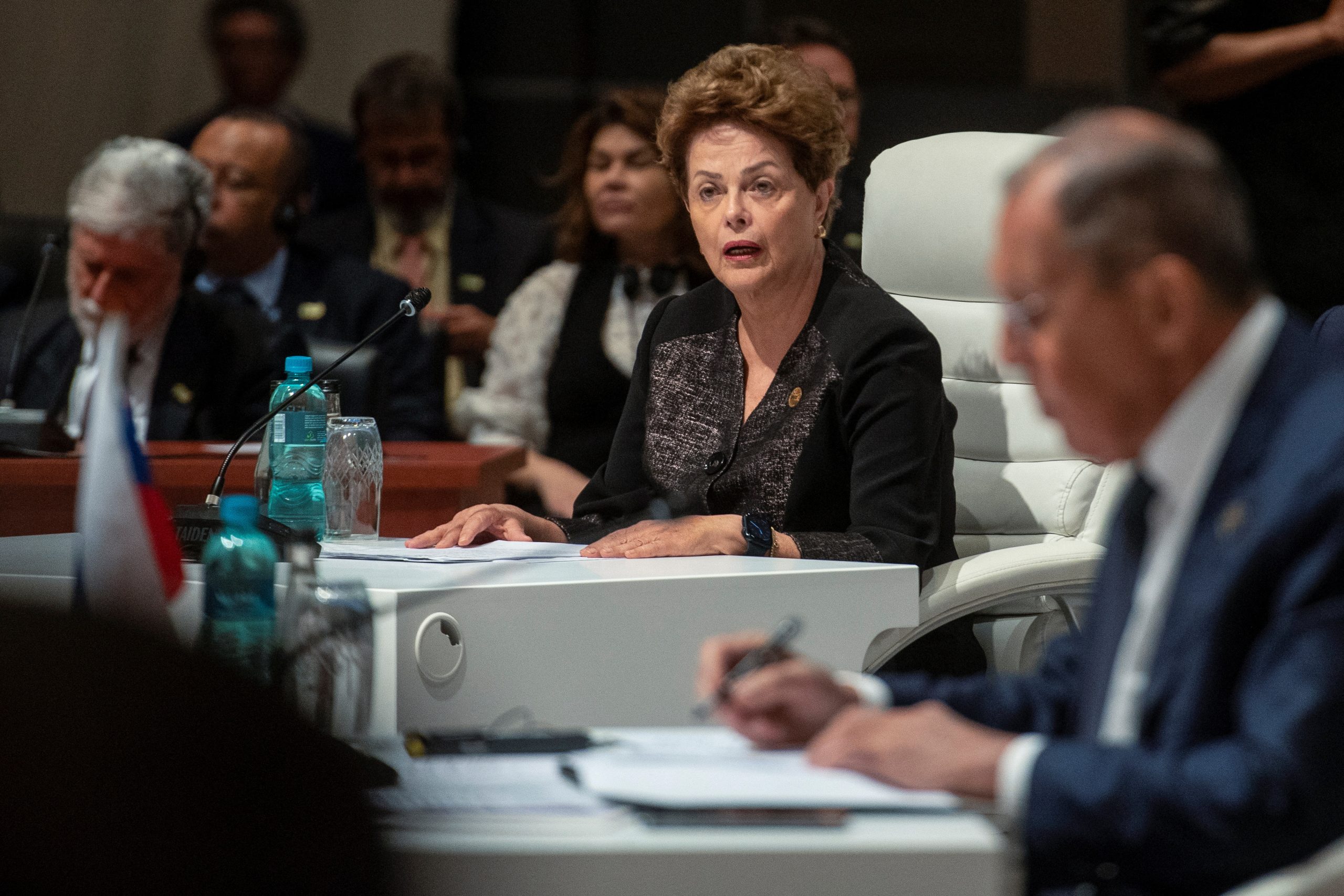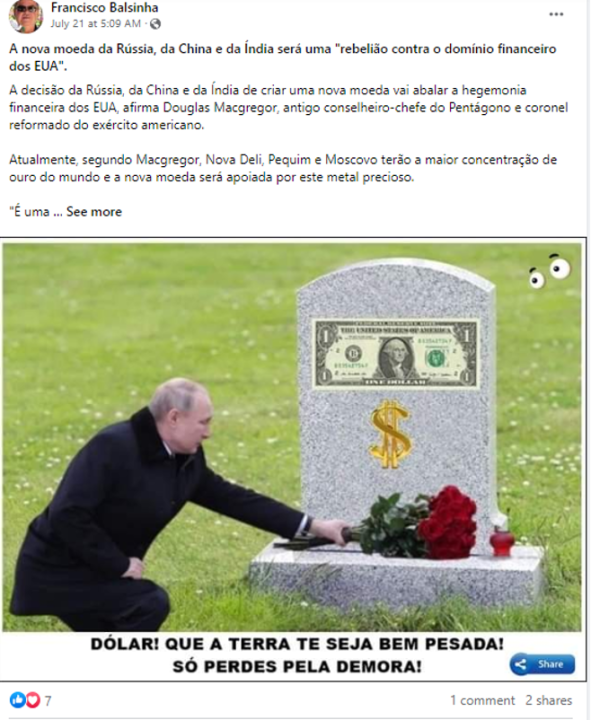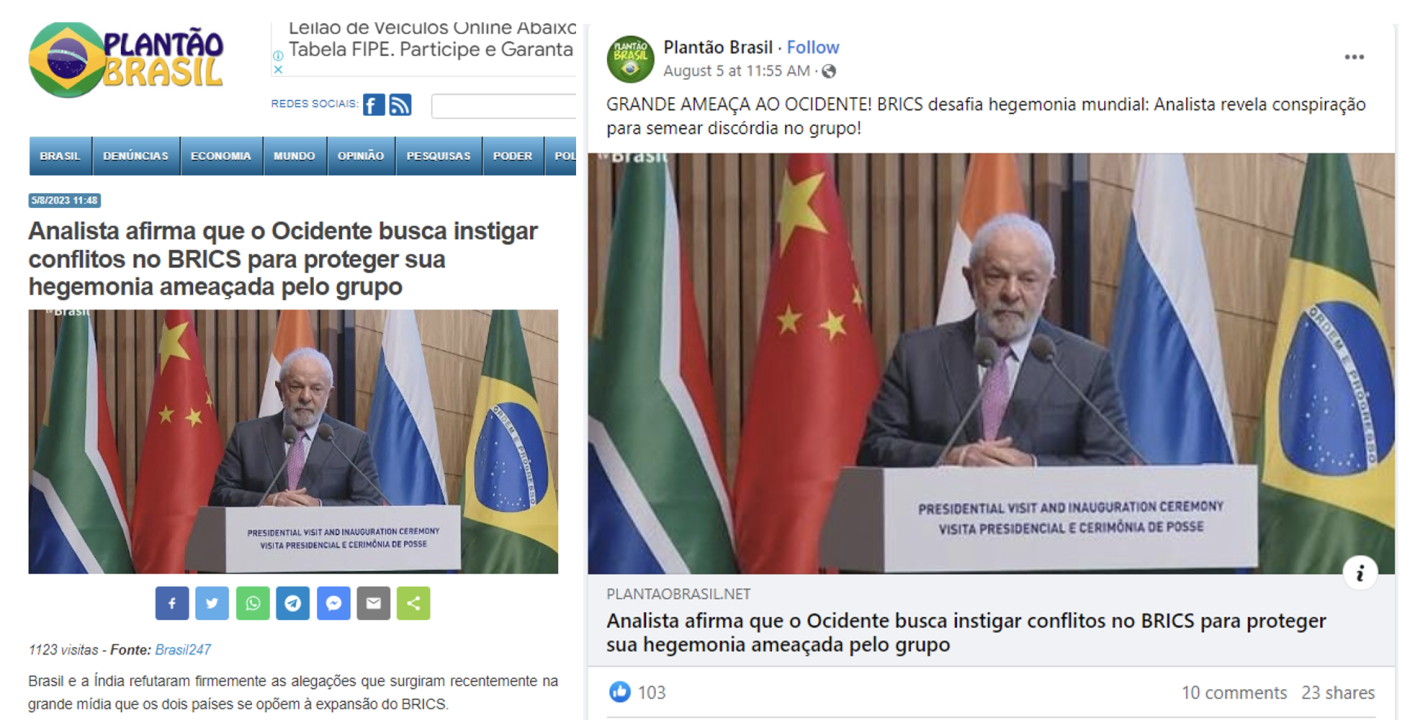BRICS narratives critical of US influence spread in Brazil prior to summit
Discussion on social media platforms focused on de-dollarization and waning US influence
BRICS narratives critical of US influence spread in Brazil prior to summit
Share this story

BANNER: Dilma Rousseff, former president of Brazil and current president of the New Development Bank, speaks at the BRICS Summit in Johannesburg, South Africa, August 23, 2023. (Source: Reuters/Alet Pretorius/Pool)
Prior the August 2023 BRICS Summit in Johannesburg, left-wing social media accounts in Brazil used a variety of platforms to advocate for a multipolar world in which power is distributed among multiple states. This effort centered on de-dollarization narratives with an anti-US or pro-Russia sentiment. The DFRLab observed similar trends across Latin America in Spanish.
The 2023 summit of BRICS nations, historically comprised of Brazil, Russia, India, China, and South Africa, gained the attention of Brazilian media outlets and social networks starting in February 2023, following the appointment of former Brazilian President Dilma Rousseff to the presidency of the New Development Bank (NDB). Operated by BRICS member states, the bank aims to provide resources for development projects in emerging economies and developing countries, including the members of the group.
Rousseff, commonly known by her first name Dilma, was impeached in 2016 in a controversial case involving politically-motivated allegations of manipulating the Brazilian federal budget; a Brazilian appeals court ultimately ruled against these charges in late August 2023. President Luiz Inácio Lula da Silva nominated her to the NBD after taking up his third term earlier this year. Lula, as the president is commonly known, participated in the founding of BRICS in 2009 and remains a strong advocate for the coalition, arguing that BRICS is strategic for advocating for Brazilian national interests in the international arena.
However, given the ongoing political polarization between Lula´s supporters on the left and former President Jair Bolsonaro’s supporters on the right, online discussions around BRICS have fragmented on Brazilian social media. While Brazilian right-wing parties have been critical of BRICS, particularly within the context of Rousseff’s involvement as head of the NDB, the left-wing has celebrated her investiture at the bank while simultaneously promoting narratives against US hegemony.
Brazilian BRICS narratives on Twitter
Using the social media monitoring tool Meltwater Explore, the DFRLab analyzed Twitter data from January 1, 2023 to August 15, 2023, focusing on the keywords “BRICS,” “Cupula dos BRICS” (“BRICS Summit”), “Banco dos BRICs” (“BRICS bank”), “Novo Banco de Desenvolvimento” (“New Development Bank”), and “NDB,” resulting in approximately 611,000 tweets over the course of the period.

Surges in Twitter discussions coincided with the proposed nomination of Rousseff to lead the NDB on February 10, the confirmation of her nomination on March 24, and her investiture as bank president on April 13. The most recent surge in Twitter discussion occurred on July 26, when Rousseff met with Russian President Vladimir Putin in Moscow during the 2023 Russia-Africa Summit. On that date, Twitter users mentioned BRICS 13,600 times, particularly in the context of the NDB potentially making loans to Russia.
According to Meltwater data, the second-most mentioned BRICS topic on Twitter since January 2023 was the proposal for a new common exchange currency for transactions between the BRICS members. The topic peaked around April 14 with a total of at least 9,400 mentions on Twitter.
On this topic, Twitter accounts aligned with the Brazilian left published content suggesting a new exchange currency would not only give BRICS countries more mobility for commercial transactions but would also avoid the impact of any future US sanctions. According to this narrative, BRICS would counter or replace current US influence around the world. For example, a tweet containing a video featuring a hip-hop track portraying the United States as a country in decline garnered more than 35,000 views. This metric refers to the number of instances in which a tweet appeared in user timelines, however, and does not reveal the number of users who watched the video in full.

Additionally, an anti-US cartoon created in 2008 by Brazilian political cartoonist Carlos Latuff re-circulated on Twitter, but it was modified to show BRICS member states punching out the United States, as represented by the character Uncle Sam. The image garnered more than 1.8 million views on the platform.

Another cartoon, posted on April 20 by Brazilian artist Loopsie, representing the BRICS countries as a group of popular high school teenagers. The cartoon garnered more than 2.1 million views, achieving the highest level of engagement among Portuguese-language tweets within the dataset.

Brazilian BRICS narratives on Facebook and Youtube
A query using Facebook monitoring tool CrowdTangle for posts on Brazilian Facebook pages and groups that referenced the aforementioned BRICS keywords during the period of June 1-August 15, 2023 showed the same narrative pattern seen on Twitter: left-wing pages and groups shared messages about de-dollarization and other content featuring anti-US or pro-Russia sentiment. For example, a left-wing group named Camaradas (“Comrades”) shared a meme showing Putin carrying flowers to a grave with the image of a US dollar bill.

In another group, Lula Haddad Resistance, a user posted a quote attributed to an organization called the Brazil-Russia Friendship Association. It claimed that the United States and Europe are leading a “Fourth Reich” – e.g., a purported successor state to Nazi Germany’s Third Reich. The post also stated that Russia, Brazil, and China are nations that promote equality and respect around the world, while the United States and NATO support Ukraine, which it referred to as “Hilter’s emulator.” It went on to cite multiple anti-Ukraine narratives frequently deployed by Russia to undermine Ukraine’s standing in the world, describing it as fascist and anti-religion.

The Brazil-Russia Friendship Association’s website, amizadebrasilrusia.com.br, states that the organization is dedicated to sharing news about Russia. There is also a Spanish edition of the website, Aliados del Sur (“Southern Allies”). According to a WHOIS search conducted with the website analytics tool DNSlytics, amizadebrasilrusia.com.br was registered on May 27, 2023. The website is mostly in Portuguese but also features some Russian content, including among its menu tabs; it also links to the Portuguese edition of the Russian Ministry of Foreign Affairs website. On August 15, 2023, the website posted an article quoting Sergei Naryshkin, the head of Russia’s Foreign Intelligence Service, as saying that BRICS would form the “bricks” of a new multipolar world.

The Brazil-Russia Friendship Association’s Facebook page, also titled Aliados del Sur, previously used the name “Papo de Comunista” (“Communist Talk”) between September 25, 2017, and April 19, 2023, according to its Page Transparency data. During that period, it posted content about Brazilian far-left parties, including the Communist Party of Brazil (PCdoB).


Another Facebook page, Plantão Brasil, which includes more than one million followers, publishes pro-Russia content, including sharing articles produced by Russian news outlet Sputnik[AC1] Brasil. For example, on August 5 at 9:13 am local time, Sputnik Brasil published an article claiming that Western countries are trying to erode BRICS. Plantão Brasil republished the article with an updated headline less than three hours later at 11:48 a.m., then shared it on its Facebook page at 11:55 a.m.


Since the start of 2023, the Plantão Brasil Facebook page has also posted videos about BRICS arguing that the group is overcoming US and NATO hegemony. Plantão Brasil cross-posted these videos to its YouTube channel, where they received significant user engagement. Utilizing the analytical tool BuzzSumo to query the same set BRICS-related keywords on YouTube, the DFRLab found that two videos posted by Plantão Brasil appeared among the top twenty most YouTubeviewed videos in the dataset. One video that focused on waning US influence accumulated more than 191,000 views, while a second video minimizing the war in Ukraine and the June 2023 Wagner mutiny garnered over 103,000 views.

Cite this case study:
Beatriz Farrugia, “BRICS narratives critical of US influence spread in Brazil prior to summit,” Digital Forensic Research Lab (DFRLab), September 6, 2023, https://dfrlab.org/2023/09/06/brics-narratives-critical-of-us-influence-spread-in-brazil-prior-to-summit.

